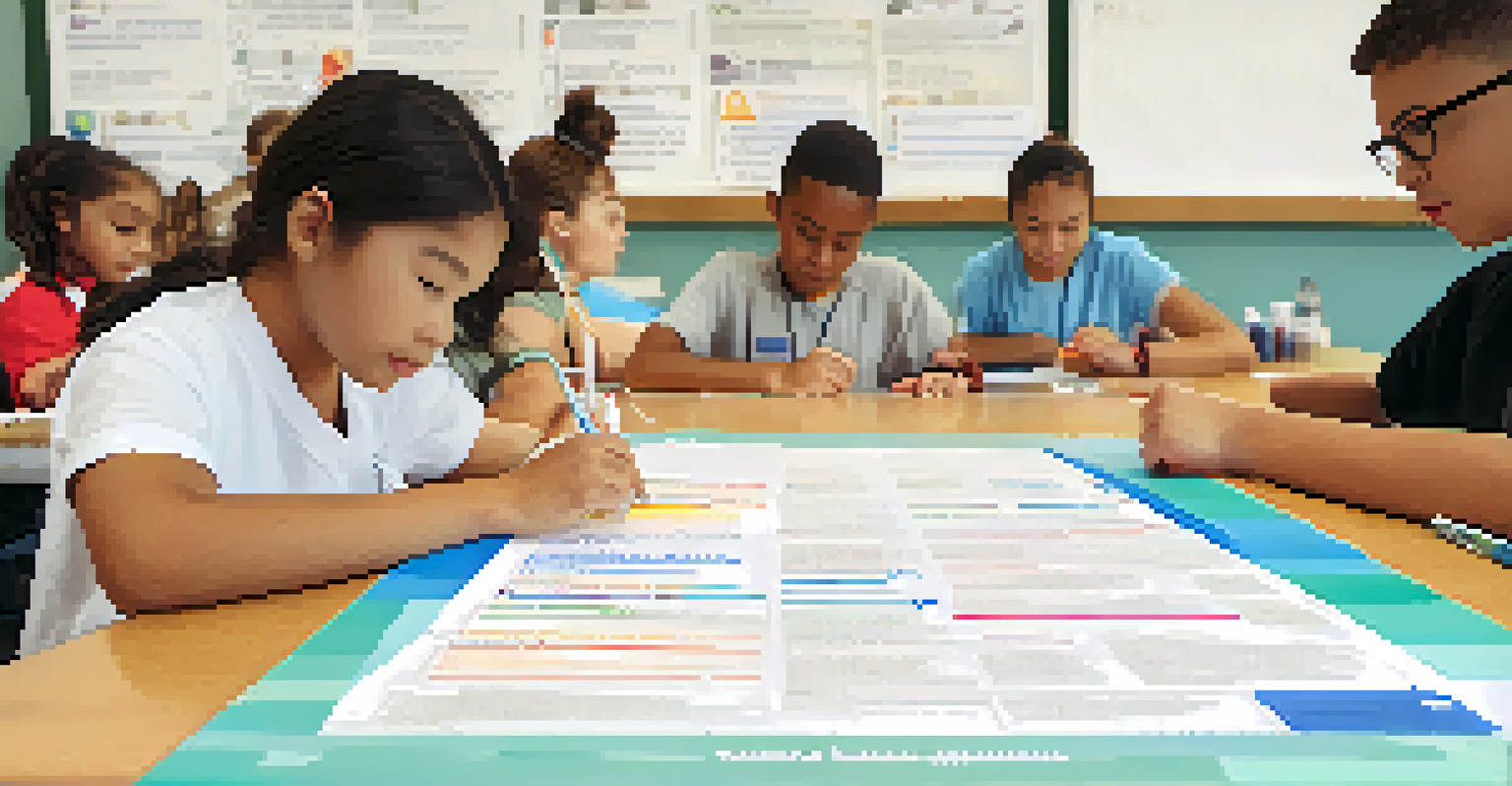The Role of Schools in Promoting Vaccination Awareness Today

Understanding the Importance of Vaccination Awareness
Vaccination awareness is crucial in ensuring that communities are protected from preventable diseases. Schools play a pivotal role in educating students and their families about the benefits of vaccines, creating a ripple effect that extends into the wider community. With misinformation often spreading faster than facts, schools must act as reliable sources of information.
Vaccines are the tugboats of preventive health.
By integrating vaccination education into their curricula, schools can help demystify vaccines and address common concerns. This proactive approach empowers students to make informed health decisions, fostering a culture of responsibility and care. Schools can also provide resources that help parents understand the necessity of vaccinations.
In an age where health misinformation is rampant, schools have the opportunity to counteract false narratives. They can encourage open discussions and provide evidence-based resources, ensuring that families receive accurate and trustworthy information about vaccines.
Schools as Community Health Hubs
Schools are not just centers of learning; they are also vital community hubs where health and wellness can be promoted. By hosting vaccination drives and health fairs, schools can facilitate easy access to vaccines for students and their families. This not only makes vaccinations more convenient but also builds a sense of community around health initiatives.

When schools partner with local health organizations, they can amplify their reach and impact. These collaborations can lead to enhanced educational programs that inform families about vaccination schedules and the importance of staying up-to-date. It’s a win-win situation where everyone benefits from improved health outcomes.
Schools as Health Education Centers
Schools play a vital role in educating students and families about the importance of vaccinations, counteracting misinformation.
Additionally, schools can serve as a trusted point for communication during health campaigns, ensuring that families receive coherent messages about vaccinations. This can help alleviate fears and encourage participation in vaccination programs, ultimately leading to healthier communities.
Engaging Students in Vaccination Advocacy
One effective way schools promote vaccination awareness is by engaging students themselves in advocacy efforts. Students can participate in campaigns, create posters, or even host events that focus on the importance of vaccinations. By involving them, schools encourage a sense of ownership and responsibility toward public health.
An ounce of prevention is worth a pound of cure.
These student-led initiatives can also help dispel myths about vaccines among their peers. When students hear information from their classmates, it can resonate more than when delivered by adults. This peer-to-peer communication can be a powerful tool in shifting attitudes and increasing vaccine acceptance.
Moreover, schools can leverage social media platforms to amplify these student-led campaigns. By sharing their experiences and facts about vaccinations online, students can reach even broader audiences, thereby enhancing community awareness and participation.
Parental Involvement in Vaccination Education
Schools have the unique opportunity to engage parents in vaccination discussions. By organizing informational sessions and workshops, they can address common misconceptions and provide answers to parents' questions. This involvement is essential, as parents are often the primary decision-makers regarding their children's health.
Schools can also distribute newsletters or flyers that highlight the benefits of vaccination and upcoming vaccination schedules. These resources can serve as gentle reminders for parents, ensuring that vaccination remains a priority in their busy lives. When parents are informed, they are more likely to ensure their children are vaccinated on time.
Engaging Students in Advocacy
Involving students in vaccination campaigns empowers them to promote awareness and combat myths among their peers.
Creating an open dialogue between parents and school staff can foster trust and cooperation. Schools can be a supportive environment where parents feel comfortable discussing their concerns, ultimately leading to more informed decisions about vaccinations.
Utilizing Technology for Vaccination Awareness
In today's digital age, technology offers numerous avenues for promoting vaccination awareness. Schools can use websites, social media, and apps to share valuable information about vaccines in an accessible format. This not only reaches tech-savvy students but also their families, who may benefit from digital resources.
Webinars and online Q&A sessions can be held to educate parents and students about the importance of vaccinations. These platforms allow for real-time interaction, making it easier for families to get their questions answered without the pressure of a formal setting. This approach can significantly enhance understanding and acceptance.
Furthermore, schools can track vaccination rates through digital systems, allowing them to identify areas that may need additional support or resources. By analyzing this data, schools can tailor their vaccination awareness programs to better meet the needs of their communities.
Addressing Misinformation in Schools
One of the biggest challenges in promoting vaccination awareness is combating misinformation. Schools can take an active role in identifying and addressing these misconceptions through educational programs. By teaching students how to critically evaluate sources, schools empower them to distinguish fact from fiction.
Incorporating discussions about misinformation into the curriculum can help students understand the importance of reliable information. Schools can organize workshops that focus on media literacy, helping students navigate the often overwhelming amount of information available online. This equips them with the skills they need to verify health information.
Parental Involvement is Key
Engaging parents through workshops and resources fosters informed decisions about vaccinations for their children.
By actively tackling misinformation, schools not only protect their students but also foster a more informed community. This proactive stance encourages students to engage in constructive conversations about vaccines, helping to build a culture of trust and understanding.
The Future of Vaccination Awareness in Schools
Looking ahead, the role of schools in promoting vaccination awareness is more critical than ever. As new vaccines are developed and health guidelines evolve, schools must remain adaptable. Continuous education will be essential to keep students and families informed about the latest developments in vaccination.
Schools can also serve as platforms for ongoing discussions about public health issues beyond just vaccinations. By fostering an environment that values health education, schools can prepare students to be proactive and informed citizens. This holistic approach will help instill lifelong health habits.

Ultimately, as schools strengthen their commitment to vaccination awareness, they contribute to healthier futures for their students and communities. By prioritizing this responsibility, educational institutions can play a significant role in shaping public health outcomes for generations to come.